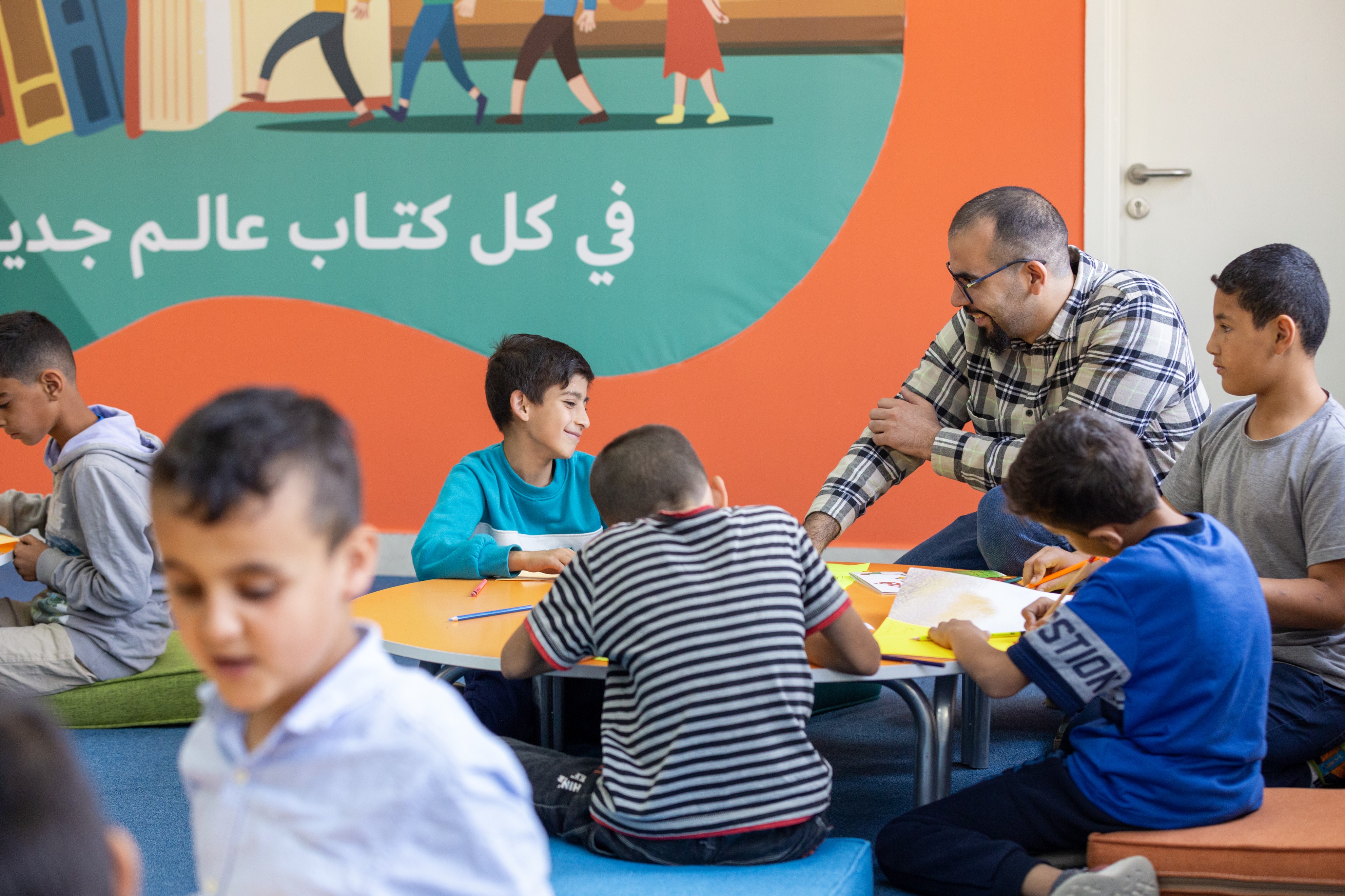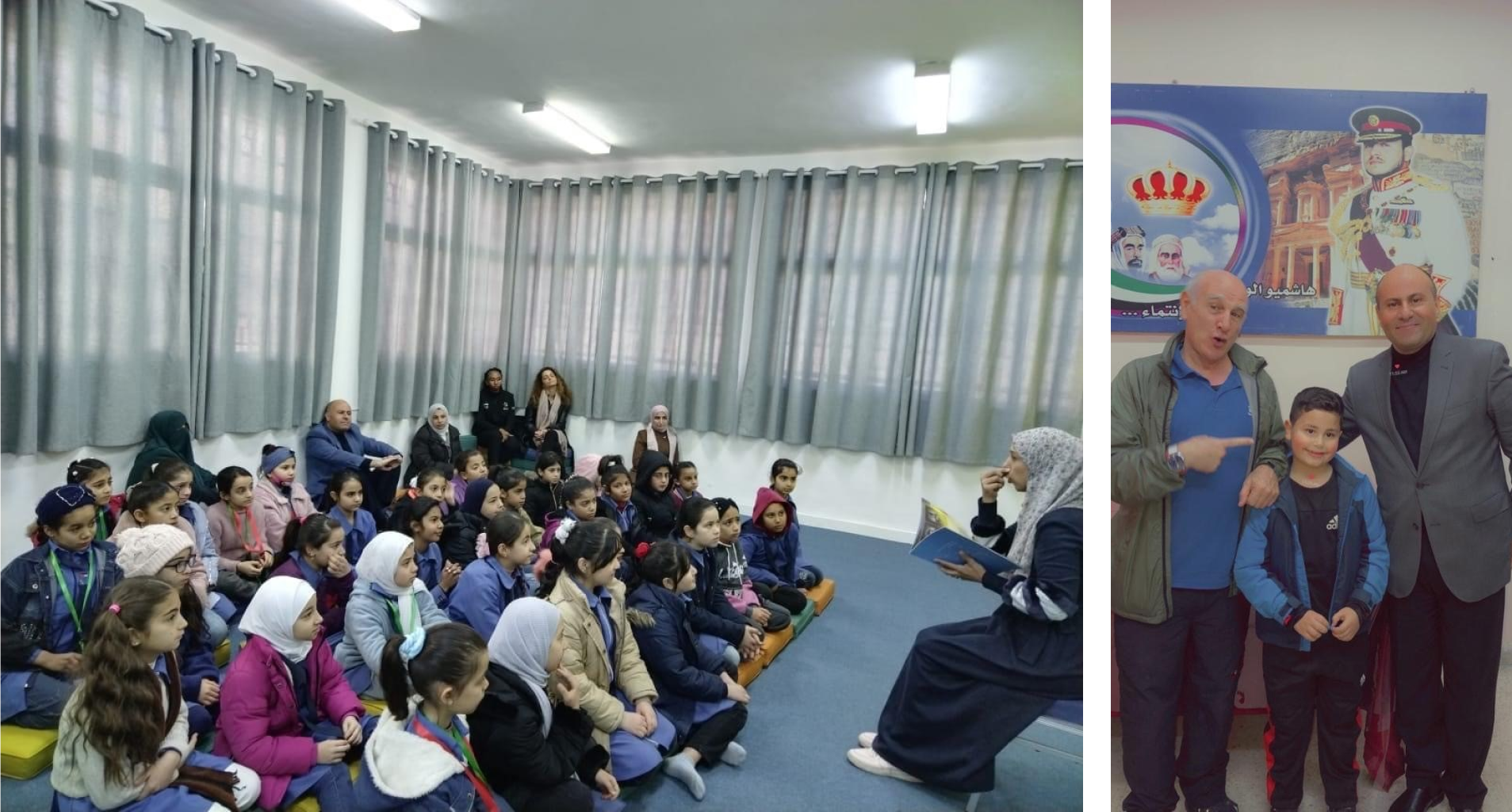Reading is the cornerstone of all other learning, and the Queen Rania Foundation “READ!” program is designed to ensure every child becomes a fluent reader in Arabic with comprehension by the time they reach middle school. This initiative focuses on renovating school libraries, providing vibrant and inviting spaces filled with age-appropriate books, and training librarians and teachers to conduct engaging read-aloud sessions and library lessons.
In Jordan, studies show that classrooms with reading materials perform better in literacy. However, many public school libraries and classrooms lack engaging and suitable reading materials, limiting opportunities for children to develop their reading skills and a love for reading. The “READ!” program addresses this gap by creating reading-friendly library spaces, providing high-quality books, and ensuring well-trained educators. Since its launch in 2022, the program has renovated 63 school libraries, trained 381 educators and librarians, distributed 48,000 books, and served over 26,000 students.
Success Stories from Naela Zawjat Othman School
Librarian's Perspective: Malak Samara
Malak Samara, the school librarian, shared her experience: “I love the READ project; it literally brought back life and genuine value into the school library, and reignited a sense of purpose to me personally.”
Malak admitted she used to feel shy about being a librarian, thinking her job wasn’t valued in the age of technology and e-books. However, the READ project in her school changed her perspective entirely. The renovated library and the focus on reading revitalized her role, making her proud and passionate about her work.
“The students now love reading and have become more competitive when it comes to how many books they read,” she said. “It not only made students love reading but also helped improve the literacy skills of many 4th-grade students, as noted by their parents. Before the renovation, some students could barely spell words. The enjoyable and smooth library experience every week encouraged them to improve.”
Malak also introduced creative incentives, such as including students in the library committee. She ensures students borrow books suitable for their level by having them read titles out loud to test their fluency. “I invested in them, which made them want to practice and improve so that they can progress to the next level of books and read to me and their parents proudly.”
The transformation extended beyond reading habits.
Students began using new terms and expressions from the stories they read, enhancing their communication skills. Malak’s role also includes handling the School Radio, where they now have a designated slot on the importance of reading, library rules, and feedback on library classes. “We had a great session where students created colorful cards with interesting stories about their love of reading and library etiquette,” she explained. Success stories of 4th-grade students borrowing up to 80 books were shared, and the next challenge is choosing the king/queen of the library.
The training provided to librarians enriched Malak’s expertise, especially in leveling books using a color code, which she found much more effective than the old classification system. Parent visits to the library have increased, and some, like one father, have started applying the techniques they saw in the library at home, encouraging their children to read more.
Parent's Perspective: Mohammad Al Awaysheh
Mohammad, a father who values the importance of reading, attended several library classes and was amazed by the transformation brought by the READ program. The renovated library, with its vibrant colors, comfortable seating, and organized books, provided a rich and enjoyable experience for both children and parents.
“One of my best days visiting the library was when I attended a short play performed by two teachers. Their storytelling was mesmerizing, bringing the story to life and engaging everyone,” Mohammad shared. The performance included questions about the story, making it interactive and fun for all attendees.
The availability of books with big visuals and little text brought Mohammad’s son closer to reading, turning it into a fun habit. “Now, my son sometimes reads at home, making reading his new fun time,” he said. Mohammad, a reader himself, feels warm-hearted when his son joins him with a book.
Reading has also positively impacted Mohammad’s son’s performance in other school subjects. Improved reading skills have led to better comprehension and grades across the board. However, Mohammad’s older son, who attends a different school, still struggles with a barely accessible library with outdated books. Mohammad hopes the READ program’s success will reach more schools.
Mohammad emphasizes the mutual responsibility between parents and schools in fostering a love of reading. He encourages all parents to raise awareness of reading’s importance, support their children, and ensure continuous encouragement for borrowing books from school to read at home.
Special thanks to the supporting organizations for this project.



